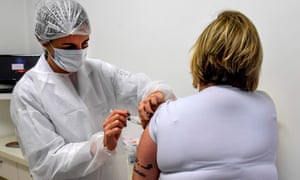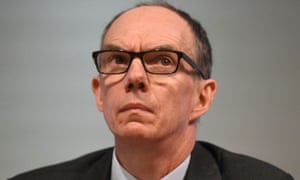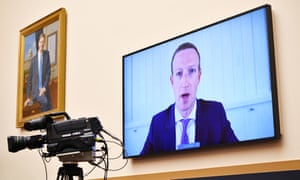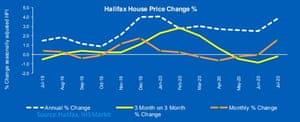

Brazilian pediatric doctor Monica Levi, one of the volunteers who received the COVID-19 vaccine, works in Sao Paulo, Brazil. Photograph: Nelson Almeida/AFP/Getty Images
AstraZeneca, the UK-headquartered drug company, has signed an agreement with Japan to supply up to 120m doses of a potential Covid-19 vaccine.
The deal is the latest move in the scramble to secure access to the AZD1222 vaccine, developed in partnership with the University of Oxford. The vaccine showed promising results in phase 2 trials, and is moving to large-scale human trials in Brazil and South Africa.
Japanese pharmaceuticals company JCR will make the vaccine on behalf of AstraZeneca, and Japan will also import doses from overseas as part of the deal.
Other Japanese pharma companies, Daiichi Sankyo and Meiji Seika, will also support the vaccine supply effort, AstraZeneca said in a statement, via Reuters.

Energy bills will fall from October for millions of people in the UK. Photograph: David J Green/Alamy Stock Photo
The energy regulator has lowered winter energy bills for 15m UK homes by reducing its energy price cap to record lows after wholesale energy market prices tumbled during the coronavirus pandemic.
Ofgem will lower the cap on default dual-fuel energy tariffs for 11m households by £84, from an average of £1,126 a year to a record low of £1,042 from this October. It will also lower the cap on energy bills for customers using pre-payment energy meters by an average of £94 a year, from £1,164 to £1,070 a year.
You can read the full report here:

Bank of England deputy governor Dave Ramsden at a press conference. Photograph: Reuters
With chancellor Rishi Sunak today signalling that there is unlikely to be any extension to the furlough scheme, it appears the UK economy could be about to experience the delayed unemployment reaction from a historic recession.
Where does that leave the Bank of England, which is already at the limits of what was thought possible in monetary policy terms a decade ago?
Bank of England governor Dave Ramsden (pictured) has been commenting today on the possibility of negative interest rates: the idea that commercial banks pay the central bank to deposit their money, theoretically giving them a strong incentive to lend money out.
“I’m not going to get into speculation about where we might be in November but we do have further headroom,” Ramsden told CNBC in an interview, a day after the BoE said it saw no immediate case to cut interest rates below zero.
The Bank on Thursday surprised some observers by including analysis of negative rates in its monetary policy report, an indication it is taking the idea very seriously.
The withdrawal of the furlough scheme – which acts as a fiscal stimulus – may mean that the Bank of England feels more monetary policy support is needed, but with interest rates at a record low and the size of the quantitative programme resulting in diminishing returns negative rates may be one of the only remaining options.
The Bank is not looking at making equity purchases, Ramsden added.
At mid-morning European stock markets have lost even the slight hint of optimism from the opening hour.
The FTSE 100 has now lost 0.3%, or 20 points – another nine points down and it will fall below the 6,000 mark.
Germany’s Dax index has lost 0.1% and France’s Cac 40 is down by 0.5%. In Italy sharse are down by 1%.
US stock market indices are pointing to a 0.4%-0.5% drop on the S&P 500, the Dow Jones industrial averagge and the Nasdaq.
Apple shares are also down by 0.8% in pre-market trading, suggesting that today may not be the day that it becomes the first company to hit a $2tn market capitalisation – it closed at $1.948tn last night.
TikTok ‘shocked’ by Trump ban and threatens US court action

TikTok faces the prospect of a ban from the US within 45 days. Photograph: Sheldon Cooper/SOPA Images/REX/Shutterstock
TikTok has responded to the executive order issued by US President Donald Trump. The Chinese social media app is not happy and is threatening legal action.
Trump said US companies have 45 days to stop all transactions with TikTok’s owner, ByteDance, as well as Tencent, the Chinese owner of WeChat. The move has added to concerns over tensions between the US and China at a time when the global economy is struggling with the recovery from the pandemic.
TikTok slammed Trump’s reliance on unspecified reports for blocking the company, as well as there being “no due process or adherence to the law”.
The statement said:
We are shocked by the recent executive order, which was issued without any due process. For nearly a year, we have sought to engage with the US government in good faith to provide a constructive solution to the concerns that have been expressed. What we encountered instead was that the Administration paid no attention to facts, dictated terms of an agreement without going through standard legal processes, and tried to insert itself into negotiations between private businesses. […]
This executive order risks undermining global businesses’ trust in the United States’ commitment to the rule of law, which has served as a magnet for investment and spurred decades of American economic growth. And it sets a dangerous precedent for the concept of free expression and open markets.
There isn’t much movement overall on the FTSE 100, but Hikma Pharmaceuticals is enjoying a strong day – now up 10% – after it said that the pandemic had prompted hospitals and distributors to stock up on drugs.
Hikma specialises in making unbranded generic drugs, and rising demand caused it to raise its profit forecasts for the year on Friday.
In a further boost, the company has started making remdesivir, an approved treatment for Covid-19 from US-based Gilead, Reuters reported.
The deal, for an undisclosed amount at its facility in Portugal, with the first batches of the antiviral drug expected “soon”.
Gilead will distribute the treatment, which was the first to be allowed to treat the illness caused by the new coronavirus. CEO Siggi Olafsson told Reuters:
The terms of the deal are confidential, we are simply a contract manufacturer for Gilead – they order products from us as they expect the sales to be.

Facebook CEO Mark Zuckerberg testifies before the House Judiciary Subcommittee on Antitrust, Commercial and Administrative Law on Online Platforms and Market Power in Washington, DC. Photograph: Getty Images
Is there a more exclusive club than the “centibillionaires”? We think not, but it has added another member: Facebook chief executive Mark Zuckerberg.
Zuckerberg’s fortune has passed $100bn (£76bn) for the first time, after Facebook’s shares surged on news it is to launch a rival – called Instagram Reels – to the video-sharing app TikTok.
Zuckerberg owns a 13% stake in Facebook and his net worth passed $100bn as shares in the social network surged by 6% on investor optimism over the prospects of the TikTok rival.
The 36-year old joins the Amazon founder, Jeff Bezos, and Bill Gates, Microsoft’s founder, as the only people who have centibillionaire status, according to the Bloomberg Billionaires Index.
You can read the full story here:

Bombardier employees work on an S-Bahn train at a plant in Bautzen, Germany. Photograph: Filip Singer/EPA
There was some interesting data from Germany earlier this morning, suggesting that the economic recovery from the coronavirus lockdown is actually proceeding faster than expected (albeit from a very deep recession).
German industrial production grew 8.9% in June compared to May, according to the Federal Statistics Office – a faster increase than the 8.1% expected by economists.
German exports also rose by 14.9% in June compared to the previous month, faster than expected.
Similarly, industrial production in France jumped by 12.7% month-to-month in June, beating the consensus for a 8.4% increase.
Holger Schmieding, an economist at Berenberg, the investment bank, said:
Following an unprecedented plunge in March and April, Germany now seems to recover a bit faster than we had initially expected. In the absence of a major accident, Germany can recoup at least half the second quarter drop in GDP in the third quarter already.
After a cumulative drop of 25% in March and April, German industry raised it output by a total of 17% in May and June. Although the badly hit capital goods sector, which includes machine tools and cars, continues to lag behind, these key industries have started to rebound strongly.
Claus Vistesen, chief eurozone economist at Pantheon Macroeconomics, cautioned that while the recovery in France and Germany will continue, it could be a lot slower than the initial pace of the rebound suggested. He said:
These numbers mean that the level production remained just over 10% below its pre-virus levels at the end of the second quarter. Looking ahead, base effects will ensure a robust increase through the third quarter as a whole, but we suspect the momentum in production and new orders for capital goods, which includes cars, will stall in the near term. In other words, the recovery from here will be slow and uneven.
‘Mini-boom’ in UK house prices but viral gloom ahead
There was a “mini-boom” in house prices in July, with a 1.6% gain compared to June, according to the Halifax house price index.
Following four months of decline, average house prices in July experienced their greatest month-on-month increase this year, comfortably offsetting losses in 2020.
That means that, despite the deep coronavirus recession, the average house price in July, £241,604, was the highest it has ever been since the Halifax index began, 3.8% higher than a year ago.

Halifax data showed a “surprising” strong increase in house prices. Photograph: Halifax
Russell Galley, Halifax’s managing director, said:
The latest data add to the emerging view that the market is experiencing a surprising spike post lockdown. As pent-up demand from the period of lockdown is released into a largely open housing market, a low supply of available homes is helping to exert upwards pressure on house prices. Supported by the government’s initiative of a significant cut in stamp duty, and evidence from households and agents suggesting that confidence is currently growing, the immediate future for the housing market looks brighter than many might have expected three months ago.
However, looking further ahead, there is still a great deal of uncertainty around the lasting impact of the pandemic. As government support measures come to an end, the resulting impact on the macroeconomic environment, and in turn the housing market, will start to become more apparent.
Sunak: Extending furlough would give people false hope
Rishi Sunak has been doing the breakfast broadcast rounds this morning. Among the most important comments so far from the (tieless) chancellor are the low likelihood of a furlough extension and hopes that a Brexit deal can be done in September.
Here is a run-down of some of the lines from the interviews, as collected by Reuters:
- Extending the furlough scheme (perhaps in a similar way to Germany’s Kurzarbeit system) would trap people, Sunak said. “It’s wrong to keep people trapped in a situation and pretend that there is always a job that they can go back to,” Rishi Sunak told BBC Radio Scotland.
- Furlough is not sustainable in the long run, Sunak said. The government should be helping people prepare for new opportunities, and the chancellor cannot save every single business or every single job, he said.
- There will not be a return to austerity, Sunak said – although he did say he wanted sustainable public finances over the medium term. Public spending will grow in real terms, he said.
- “On Brexit, as you will have heard recent reports, we remain confident that it’s possible to get a deal in September,” he told Sky News.
- The Bank of England’s forecasts are right to show that economic difficulties will remain, he said. Sunak told BBC News: “They are right to say that hardship lies ahead.”
- If the government can drive a recovery he is confident the UK will be repaid many of the emergency loans given to companies – but some of the loans will “absolutely” have to be written off.
- And asked whether he has a desire to be prime minister, he said he does not have that desire.
The FTSE 100 is pretty much flat in the early exchanges, gaining 0.1%.
The biggest gainer is Hikma, up more than 7% after it reported that the pandemic had boosted pharmaceutical sales.
Hargreaves Lansdown, the online investments broker, is up 3.8% after reporting a jump in full-year earnings thanks to increased share trading during the crisis – even though the size of the assets managed through its platform was hit.
In Germany the Dax index has gained 0.3%, while France’s Cac 40 is flat and Spain’s Ibex has lost 0.1%.
Introduction: Markets held back by Chinese app retaliation concerns
Good morning, and welcome to our live coverage of business, economics and financial markets.
There was some mild optimism growing in financial markets on Thursday as US politicians moved closer to agreement on the terms of another round of massive fiscal stimulus, but US President Donald Trump has put paid to that with an offensive against two prominent social media apps.
Hong Kong’s Hang Seng fell 1.8%. WeChat owner Tencent, Asia’s second-biggest company by market capitalisation, dropped as much as 10%, before recovering to a 5% fall. Mainland China’s CSI 300 Index fell 0.9% while Japan’s Nikkei slipped 0.4%. S&P 500 futures slid 0.2%.
Trump has given American companies 45 days to stop dealing with ByteDance, the Chinese owner of TikTok, and WeChat, the messaging platform owned by Tencent. His executive order said:
the spread in the United States of mobile applications developed and owned by companies in the People’s Republic of China (China) continues to threaten the national security, foreign policy, and economy of the United States.
TikTok in particular is targeted because of its immense popularity in America, and its consequent ability to harvest personal data for China’s Communist party – although the company denies that it would ever hand data over. The Tencent ban was issued on similar grounds, causing concerns that retaliation from China against US companies could be imminent.
The FTSE 100 is expected to open flat today, but many traders’ eyes will turn towards the major economic event of the day: the US non-farm payrolls data due this afternoon in London time.
The consensus forecast of 1.58m for July would be a large drop from the 4.8m measure of how many new jobs were created in June.
Han Tan, market analyst at trading platform FXTM, said:
The July jobs figures is expected to unveil a marked slowdown in hiring compared to stunning gains seen in the prior two months, which may fuel concerns that the US recovery is losing its momentum.
Still, Thursday’s better-than-expected weekly jobless claims figure of 1.19 million, which is the lowest number of applications for US jobless benefits since March, offers hope that the US economy can continue moving into the post-pandemic era. If the jobs market can stage a sustainable recovery from here, that could spur more risk-on market activity while offering relief for the beleaguered Dollar.
The agenda
- 8:30am BST: Halifax house price index (July; previous -0.1% month-on-month)
- 1:30pm BST: US non-farm payrolls (July; prev. 4.8m, consensus 1.58m)
Updated
at 2.53am EDT


